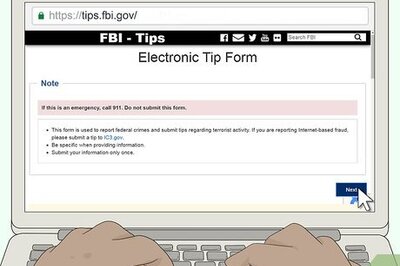
views
Crafting a Compelling Rumor

Figure out your goal. Maybe you want to humiliate someone, maybe you want to break up a relationship, or take down a government. You might even want to start a rumor about yourself to get more attention. The reasons for starting a rumor are many, but in order to create the right rumor you need to have a goal in mind while you make it up. Decide if there is a more ethical way of achieving your goal. Unless the rumor is true, starting a rumor involves lying and deceiving people that trust you. It may not be worth it.

Prey on anxieties. Many of the most widely spread rumors trigger an emotional response in a great number of people. During World War II, both England and Germany made propaganda posters against gossip because the spread of war rumors caused such panic among the public. These rumors spread so fast because they made people nervous and afraid. If you create a rumor that preys on a common fear or anxiety, there will be a strong chance that people feel compelled to talk about it. Try to make the topic one that is relatable to the most people. Most people generally have anxieties about their safety, how they look, money. For example, if you spread a rumor that you won the lottery you would probably find it spread pretty fast and influenced the way a lot of people acted around you.

Satisfy the public desire. If many people want to believe the rumor is true, then they will take it as truth. If a movie is very popular, it would be easy to spread a rumor they are making a sequel. Whether it is true or not, a good number of people are likely to believe it because they hope it is true. People spread rumors about celebrities because they are jealous and hope to bring down the image of their target. The rumor catches on due to a mutual desire by a large number of people to spread the same impression.

Make the rumor believable. A rumor can be shocking, but it should not seem ridiculous. People might believe that you were attacked by a bear and survived. Most people probably won't believed you were attacked by a talking panda with a samurai sword. If your rumor is going to survive, make it plausible.

Keep it simple. Avoid adding too many details, so the main idea of the rumor is not lost. A single detail or two is okay to add a little context to the rumor. However, keep it simple and count on the snowball effect. Rumor spreaders are known to add their own details. To give an example, if you were to start a rumor that someone had cosmetic surgery, you'd have very little details to distract from the actual rumor. If you say someone had paid $8,000 to have their lips done to look like exactly like Angelina Jolie after her first surgery, not her second one; it gets confusing. Is the rumor that she spent a lot of money, that she had surgery, or that she has some weird obsession with Angelina Jolie? Just keep it simple instead.
Spreading the Rumor

Convince others to spread your rumor. The key to getting a rumor going is to convert someone to believing your story. Some people are more gullible than others and are more likely to accept a rumor as truth. Others might ask for evidence or your source. Try to avoid starting your rumor by telling anyone that has a very curious nature.

Hone in on the bigmouths. If you tell the shy person, your rumor will probably be not be passed along very often. But if you tell someone that gossips a lot and has a lot of friends, the rumor will travel further. It is also a good idea to point to a big gossiper as the origin of the rumor. Often times a big gossip spreader will talk so much that they can't remember what they heard and who it came from.

Use several means to transmit the rumor. Aside from passing the rumor by word of mouth, see if you can spark the rumor elsewhere. Try making a fake account on social media and spread the rumor online. Since almost everyone is connected through social media, rumors can spread very fast. Leave evidence around. This can be difficult, but it will go a long way towards helping your rumor. If you start a rumor that you saw your target eating dog food, it may seem too silly to others. But if you also plant pieces of dog food around the target's desk or in their lunch and people notice, your rumor will suddenly seem quite believable and take off.
Covering Your Tracks

Make the rumor hard to disprove. Don't make up a story that can easily be disproven or the rumor will die quickly. If the story can't be discredited with proof, it will have a better chance at spreading. As an example, if you say someone lost an arm in a car accident, the rumor won't hold up very long when the person is seen with both their arms intact. However, if you start a rumor that someone hit a homeless person with their car, it may be very difficult to prove as a lie.

Keep your accomplices to a minimum. You may need an accomplice or two at times, but keep the circle small. The more people that are in on the rumor, the more likely it is one of them will confess the truth. Only involve people that you know can keep a secret. Sometimes it can be very hard to never take credit for masterminding a successful rumor.

Don't let the rumor lead back to you. The best way is first tell the rumor to a friend you trust. Tell the friend if they tell the rumor to anyone else to say they did not hear it from you because you promised to keep it a secret. If for some reason the rumor comes back to you, your best bet is just to deny it since there is no proof anyway.


















Comments
0 comment